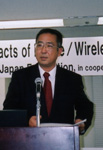Tokyo Forum; November 21, 2002
Realizing the Potential of Broadband: Infrastructure, Markets, Service
Kobo INAMURA
(Director General, ICT Policy Planning, Ministry of Public Management, Home Affairs, Posts and Telecommunications)
This is a summary of Mr. Inamura's presentation at the Tokyo Forum on November 21, 2002.
 The Japanese usually starts his or her speech with an apology, but I will start my speech with an excuse that any of my opinion or view expressed during my presentation is purely my own and not necessarily represents the Japanese government to which I belong. The Japanese usually starts his or her speech with an apology, but I will start my speech with an excuse that any of my opinion or view expressed during my presentation is purely my own and not necessarily represents the Japanese government to which I belong.
Infrastructure Construction and Actual Usage
First, I will talk about broadband access in Japan. Prices are dropping sharply, and broadband access costs in Japan are now less than half those in the U.S. These figures are average prices, including those of ADSL and FTTH. For example, $20 per month is for Yahoo BB's service (8 Mbps/900 kbps) in Japan, whereas $60 per month is for Verizon's service (1.5 Mbps/128 kpbs) in the U.S.
Although Japan is not a socialistic state, we are well accustomed to having a target. The government said that by the year 2005 high speed services (ADSL) should be available to 30 million households, and ultra high speed (FTTH) should be made available to 10 million households. Actually there are 47 million households in Japan as a whole. And then I wondered how to deal with the remaining 7 million households without high speed services.
But those targets have already been achieved at least in terms of infrastructure construction. As of April, 2001, 35 million households were able to have high speed services, and 14 millions to have ultra high speed services.
But unfortunately, there are not enough users while capacity is there. For ultra high speed FTTH, actual users are only 99,000, that is 0.7% of the capacity. Even for high speed Internet such as ADSL, actual users account for 16.2% of the capacity. We have to think about why this is still the case.
Reasons for Not Using the Internet
Regarding reasons for not using the Internet, "not need to use" is leading, and followed by "lack of PC skills." Some Japanese feel that they need facsimile technology but not PCs. There is a lingering concern about the use of the Internet, due to serious security problems. In case of telephone it took 70 years to make it stable, and I don't know if we have a dog year or a mouth year to solve this serious problem with the Internet.
I myself believe that in the field of rural telecommunications, the genuine Internet can be much more efficient, rather than constructing "super expressways" of telephone lines or whatever. Similarly, in Eastern Europe, when the Soviet block fell apart, they introduced mobile telephone services immediately. In China it also happened. So, I am thinking of how to introduce that kind of open and genuine Internet services to those who are suffering in poor social strata in a much more inexpensive manner than it is now.
I would like to talk about future issues, but I will skip most of those issues except utilization of digital TV from the year 2003. Residents in Tokyo, Osaka and Nagoya will start receiving digital TV signals, and digital TV is connected to the network. We have successfully been developing a digital high definition TV system, and probably should have digital TV networks connected to the Internet or some other telecommunication services.
Asia's Broadband Programs
While Asia's trade flows with the U.S. and also with Europe are as large as those between the U.S. and Europe, communication flows between Asia and the Western countries are very small relative to those between the U.S. and Europe.
There are some serious problems such as the language problem. For instance, in some parts of Asia they cannot provide their own national characters with PCs, while there is no such problem with the telephone system.
It is important to have a multilingual environment for expanding broadband in Asia. Without such an environment, we should be careful in testing merits and demerits of open systems as opposed to closed systems. We have to cope with this language problem. Otherwise, we Japanese would lose our own cultural tradition and historical accumulation along with our language.
Security for Japan
Regarding the security issue, Japan is one of the representative free countries. The key word is "open society and its enemies" in my mind. Now Japan and the U.S. have an alliance, but in the case of our military alliance, we have an asymmetrical one. In this field of security in communications, we want to be a real partner; real, balanced and equal partnership to defend our open society and our own freedom. Thank you.
| 




